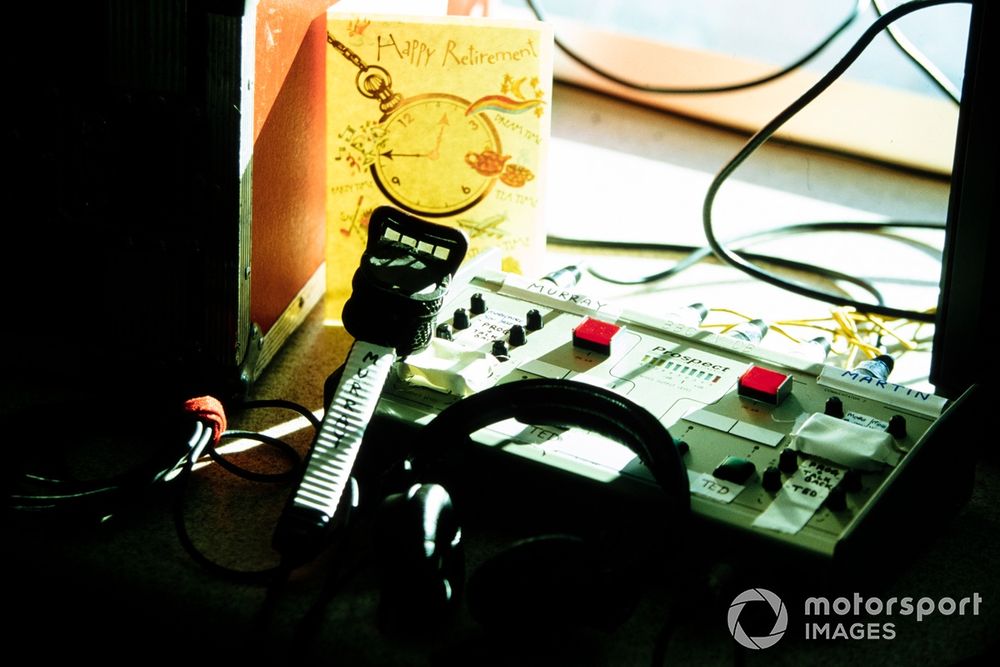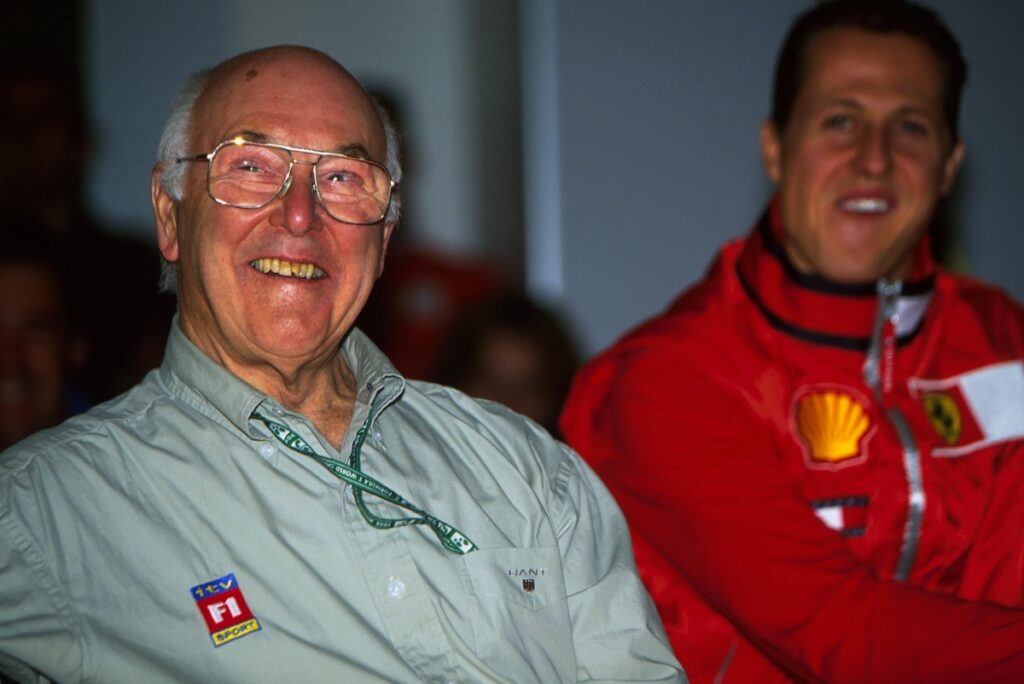“What I wanted above all else after 52 years of talking about grand prix racing, was to go out on a high note and be euphoric about the fact that we have just seen a great race… So that’s the last from me. All I can say is, it always has been a pleasure and I hope that you will enjoy grand prix racing from now on. Goodbye.”
With these words to camera, in a commentary box high above the grandstand at Indianapolis, legendary F1 TV commentator and my mentor, Murray Walker, signed off his epic career and final commentary at the US Grand Prix. It was 30 September 2001, two weeks before the great man’s 78th birthday. It was the end of an era.
How do you end a career like Murray’s? By not going on too long. Despite his advanced age, Murray was always supremely fit; he worked out three times a week in the gym and still had a bone-crushing handshake into his 90s.
But the travel had begun to take its toll and on the eve of the 2000 F1 title showdown in Suzuka he was unsure if he could broadcast, having contracted a respiratory illness. He had already missed the French GP that year after dislocating a hip.
I filled in for him there and over the winter it was decided by ITV head of sport Brian Barwick that Murray would have a final swansong season in 2001 with me taking on five races as a prelude to the full-time role from 2002. My understudy Ted Kravitz would replace me as pitlane reporter, alongside Louise Goodman, a role Ted still performs brilliantly today for Sky Sports.
Ted’s role in the ITV team had been as a commentary box producer, a third wheel alongside Murray and Martin Brundle. He remembers that final broadcast vividly.
“It’s weird, I don’t remember thinking as he came into the comm box, ‘Wow, this is the last time,’” says Kravitz. “There was a kind of determination from both Martin and I to make everything perfect. We didn’t want an annoying call. We didn’t want any mistakes.”
Kravitz remembers a desire to ensure everything was perfect for Walker’s farewell commentary
Photo by: Clive Rose / Motorsport Images
The race had been selected for Murray’s finale so he could sign off in front of a primetime TV audience in the UK. But the weekend was overshadowed by the 11 September terrorist attacks on the World Trade Centre and Pentagon. In among the celebrations for Murray, were commemorations for the 3,000 people killed in the atrocity. Teams ran black nosecones in mourning. Many drivers didn’t want to be there, let alone race under such circumstances.
Despite the pall cast by 9/11, F1 organised a touching event for Murray on the Saturday night. Bernie Ecclestone gave him an F1 pass for life. Tony George, then CEO of Indianapolis Motor Speedway, presented Murray with a brick from the original track laid in 1911. It might sound odd today, but this gesture moved Murray the most, being a keen student of racing history. The brick instantly became one of his most treasured possessions.
Many of the drivers and team bosses were there, including David Coulthard, Jenson Button and Rubens Barrichello. World champion Michael Schumacher, who was a far better sport than he was given credit for, was there too. He joined Murray on stage to read out some Murray “bloopers” relating to him. My favourite was, “And here comes Ralf Schumacher, the son (sic) of world champion Michael Schumacher. Now the boot is on the other Schumacher.”
He clearly didn’t want any more fuss. Much as he loved being the centre of attention, he also knew when enough was enough
Once the race was over, we all gathered for a final drink in the TV compound. It was brief. Murray normally didn’t enjoy the stress of rushing to the airport after a race. He preferred a leisurely journey home on the Monday. So it was out of character that he had decided to book a Sunday night flight out of Indianapolis. Looking back, he clearly didn’t want any more fuss. Much as he loved being the centre of attention, he also knew when enough was enough.
This came up again 20 years later when he passed away, aged 97. We learned he had left strict instructions in his will for no funeral and no memorial service. It was a source of great regret to myself, Martin, Ted, Louise and many others who had the pleasure of working with him over the years.
“He didn’t like a fuss, he was old school like that,” says Goodman. “His wife was with him that Indianapolis weekend and she was a woman who didn’t like a fuss. She had not played any part in his F1 life. So he was very matter of fact about it. But he really enjoyed that Saturday night and the fact that all of F1 came out for him.”

Walker was held in exceptionally high regard by all who knew and worked with him, making the 2001 US GP broadcast a true end of an era
Photo by: Clive Rose / Motorsport Images
In this article
Be the first to know and subscribe for real-time news email updates on these topics
Subscribe to news alerts
Read the full article here

